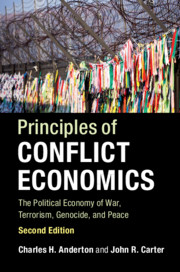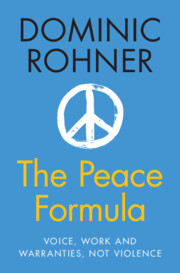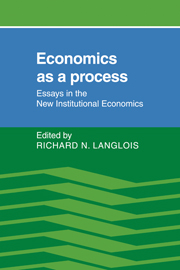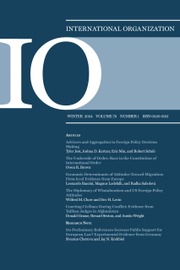Principles of Conflict Economics
The Political Economy of War, Terrorism, Genocide, and Peace
2nd Edition
$49.99 USD
- Authors:
- Charles H. Anderton, College of the Holy Cross, Massachusetts
- John R. Carter, College of the Holy Cross, Massachusetts
- Date Published: April 2019
- availability: This ISBN is for an eBook version which is distributed on our behalf by a third party.
- format: Adobe eBook Reader
- isbn: 9781316880142
Find out more about Cambridge eBooks
$
49.99 USD
Adobe eBook Reader
Other available formats:
Paperback, Hardback
Looking for an inspection copy?
This title is not currently available on inspection
-
Conflict economics contributes to an understanding of violent conflict and peace in two important ways. First, it applies economic concepts and models to help one understand diverse conflict activities such as war, terrorism, genocide, and peace. Second, it treats coercive appropriation as a fundamental economic activity, joining production and exchange as a means of wealth acquisition. In the second edition of their book Principles of Conflict Economics, Anderton and Carter provide comprehensive, up-to-date coverage of the key themes and principles of conflict economics. Along with new scholarship on well-established areas such as war, terrorism and alliances and under-researched areas including genocides, individual and family aspects of war, and conflict prevention, they apply new economic tools to the study of war and peace such as behavioral economics and economics of identity and offer deeper research and policy insights into how to reconstitute societies after large-scale violence.
Read more- Incorporates new tools and theoretical perspectives, including behavioral economics and economics of identity
- Provides more extensive coverage of macroeconomic concepts and issues such as genocides and mass killings, weapons technologies, and conflict management and peace
- Includes simple graphs, intuitive narratives, and applications of standard economic concepts and methods which will be of use to both economic and noneconomic audiences
Reviews & endorsements
'The new edition is greatly extended in terms of scope, background, up-to-date examples, and insights. This edition is a monumental achievement that addresses a topic of utmost importance in our conflict-ridden world. The forces of globalization make the study of conflict and its resolution of ever-increasing importance. This book needs to be read widely.' Todd Sandler, Vibhooti Shukla Professor of Economics and Political Economy, University of Texas, at Dallas
See more reviews'This second edition of Principles of Conflict Economics offers a compelling overview of how economics could help unpack the drivers and dynamics of a broad array of violent conflict typologies. Economists and non-economists will find the thoughtful analysis and relevant empirical work surprisingly accessible and applicable.' Raymond Gilpin, Academic Dean, Africa Center for Strategic Studies, National Defense University and former Economics Director, US Institute for Peace
'In this book, Charles H. Anderton and John R. Carter have reconstructed the basic principles of economics, starting from a recognition that the benefits of production and exchange in markets depend on solutions to fundamental problems of conflict.' Roger B. Myerson, David L. Pearson Distinguished Service Professor of Global Conflict Studies, University of Chicago and recipient of the 2007 Nobel Memorial Prize in Economic Sciences
'This pioneering contribution addresses an important topic which is much neglected by economists. It makes an original contribution to knowledge dealing with all aspects of conflict by providing a nice mix of theory and applications.' Keith Hartley, University of York
'I am pleased to see this second edition of the text, especially its additions of behavioral, identity, and social network economics to the standard tools of rational choice and game theory. Important also is the attention paid not just to 'bads' such as terrorism, war, and mass atrocities, but to the increasing knowledge regarding the economics of stable peace and security. As before, the text is impressively rich in real-world data and applications, and it is very current on a vast array of literature. With a text like this, conflict and peace economics should now enter the mainstream of undergraduate economics education.' Jurgen Brauer, Augusta University, Georgia
'This comprehensive text on the economics of war and peace is indispensable to students and policy-makers alike. It demonstrates how to parse seemingly radical issues to see them through an economic lens and conveys the importance of economic analysis in solving some of the most pressing issues humanity faces.' Shikha Silwal, Washington and Lee University, Virginia
'This book remains the most accessible and comprehensive treatment of the analysis of conflict. The authors have added new insights from behavioral, cyber, identity, and network economics, thereby capturing some of the most important recent developments in the field. It is an outstanding contribution to conflict economics.' Daniel Arce, Ashbel Smith Professor of Economics, University of Texas, Dallas
Customer reviews
Not yet reviewed
Be the first to review
Review was not posted due to profanity
×Product details
- Edition: 2nd Edition
- Date Published: April 2019
- format: Adobe eBook Reader
- isbn: 9781316880142
- contains: 241 b/w illus.
- availability: This ISBN is for an eBook version which is distributed on our behalf by a third party.
Table of Contents
Part I. Introduction:
1. Nature, scope, and interdependencies of conflict and economics
Part II. Key Concepts and Models for the Economic Analysis of Conflict and Peace:
2. Production possibilities and economic growth
3. Demand and supply
4. Rational choice theory
5. Game theory
6. Behavioral economics and the economics of identity
7. Network economics
8. Conflict success functions and the theory of appropriation possibilities
Part III. Economic Aspects of War, Terrorism, and Genocide:
9. Geography and technology of conflict
10. Bargaining theory of war and peace
11. Conflict between states
12. Civil wars
13. Terrorism
14. Genocides and other mass atrocities
Part IV. Security and Peace:
15. Arms rivalry, proliferation, and arms control
16. Security alliances
17. Peace.
Sorry, this resource is locked
Please register or sign in to request access. If you are having problems accessing these resources please email lecturers@cambridge.org
Register Sign in» Proceed
You are now leaving the Cambridge University Press website. Your eBook purchase and download will be completed by our partner www.ebooks.com. Please see the permission section of the www.ebooks.com catalogue page for details of the print & copy limits on our eBooks.
Continue ×Are you sure you want to delete your account?
This cannot be undone.
Thank you for your feedback which will help us improve our service.
If you requested a response, we will make sure to get back to you shortly.
×







